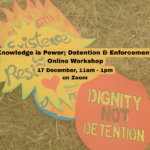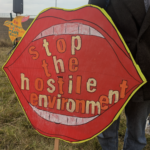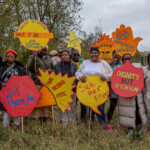By Lisa
The UK government’s announcement about rescue operations in the Med shows a stubborn refusal to examine the bigger picture.
It was with a sick feeling in my stomach that I read of the Foreign Office announcing that the UK will not support any future search and rescue operations to prevent migrants and refugees drowning in the Mediterranean. A nausea born out of anger, shame, and a dreadful absence of surprise.
In a recent discussion about the role the UK can play in protecting Eritreans seeking sanctuary in the UK, I was asked my opinion of the best way to advocate for the government to do more to protect Eritrean men and women from the horrors of trafficking and kidnapping en route. My cynical reply was, I hoped, overly cautious – that it would be difficult to engage the British government on this issue because, quite frankly, they aren’t really that opposed to measures that stop migrants reaching the shores of the UK, no matter what harm, torture, rape and abuse migrants suffer on the way. They are more interested in pushing back than protection, bitter that they cannot officially limit the number of refugees given protection in the UK (though the Home Office do a pretty good job of keeping numbers as low as possible through its woeful decision-making). Asylum quotas: that would get the government closer to its unrealistic and unattainable (let alone undesirable) immigration quotas, and it would keep the right-wing press and imagined public opinion happy in the run-up to the General Election. It’s just a matter of that pesky international law that prevents them doing this, and the Refugee Convention is one of the few human rights instruments the government has yet to try and wriggle out of.
So when I read of the UK’s latest decision not to save human lives, my cynicism was miserably confirmed. The rationale for letting people die? That saving lives would simply encourage more people to attempt the dangerous crossing of the Mediterranean. It’s a deterrent, you see. To stop these migrants ‘swamping’ the UK, they must be treated like children, with a rap across the knuckles when they are naughty. Except in this case, the rap across the knuckles is abandoning people to die terrible deaths because they have dared to seek a better life (better than persecution, better than torture, better than war, rape and oppression, better than struggling to survive and support one’s family) in Europe.
Tunnel vision
The UK state likes to position itself as a global leader, but from a position of profound insularity. This latest announcement, the abandonment of migrants in appalling conditions in Calais (desperate to make perilous journeys across the Channel to the mythic human rights and ‘fair play’ of the UK), the pouring of money into Frontex to protect the boundaries of Fortress Europe; all heartless strategies that ignore both the humanity of migrants, and the political-economic reasons why human beings move across national borders.
‘Immigration’ now has such symbolic significance in political debate that any discussion of the causes of migration is silenced. Whilst immigration has become a political obsession, the act of migration itself has been effectively depoliticised and decontexualised.
The view that ‘they’re all trying to come to the UK’ not only leaves unexamined the historic (colonial) reasons for many migrants speaking English and having established communities here, but also neatly avoids the question ‘why did they leave?’. We are unlikely any time soon to see the UK government face acknowledge its responsibility (past and present) in creating the conditions that force people to migrate but we must create space for hearing about why people migrate – the ‘immigration debate’ is dominated by pull-factor panic rather than push-factor analysis, or reflection on the extraordinary journeys migrants endure, and survive.
The inevitability of migration
Most migrants do not want to leave behind their countries, their culture, their family and friends and all that they know in order to scrape an existence at the bottom of the social hierarchy in Europe. But while while war, persecution, and impoverishment (often exacerbated by policies imposed by the West) exist, human beings will migrate. Migrants will still attempt the journey across the Mediterranean, whether there are rescue operations or not. The difference is the amount of people who will die.
Imagining how bad things must be in someone’s home country for them to journey for months and maybe years across the world, taking terrible risks along the way, is not an easy task. Wanting a better life, though, is that so hard to understand?













Discussion: